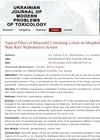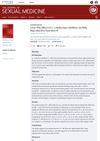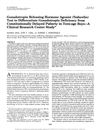 2 citations,
January 2015 in “Springer eBooks”
2 citations,
January 2015 in “Springer eBooks” Environmental factors and exposure to toxins may contribute to male infertility by affecting sperm and hormone function.
 November 2013 in “John Wiley & Sons, Ltd eBooks”
November 2013 in “John Wiley & Sons, Ltd eBooks” The document concludes that accurate diagnosis of male and female gonadal disorders is crucial for effective treatment and better patient outcomes.
 November 2020 in “Ukraïnsʹkij žurnal sučasnih problem toksikologìï”
November 2020 in “Ukraïnsʹkij žurnal sučasnih problem toksikologìï” Minoxidil lotion may harm male reproductive health.
[object Object]  77 citations,
June 2015 in “Nature Reviews Urology”
77 citations,
June 2015 in “Nature Reviews Urology” Some common medications can harm male fertility, but many effects can be reversed.
 August 2024 in “The Journal of Urology”
August 2024 in “The Journal of Urology” The 2024 guideline updates recommendations for genetic testing, imaging, and sperm retrieval in male infertility.
 June 2007 in “Endocrinology and Metabolism Clinics of North America”
June 2007 in “Endocrinology and Metabolism Clinics of North America” The foreword introduces a medical issue discussing male hormonal health, treatments, and the effects of conditions like obesity and aging.
 213 citations,
June 2017 in “Rheumatology”
213 citations,
June 2017 in “Rheumatology” The guidelines suggest a detailed approach to diagnosing and treating lupus, with a focus on regular check-ups, personalized medicine, and a range of drug options for different cases.
 68 citations,
February 2019 in “Urology”
68 citations,
February 2019 in “Urology” Hormonal treatment in transgender women reduces semen quality, but stopping treatment may improve it.
 58 citations,
March 2013 in “Human Reproduction Update”
58 citations,
March 2013 in “Human Reproduction Update” Products should be called 'sperm-safe' only after thorough, well-designed tests.
 28 citations,
October 2018 in “Clinical Obstetrics and Gynecology”
28 citations,
October 2018 in “Clinical Obstetrics and Gynecology” Testosterone therapy seems safe and effective for transgender men with proper care, but more long-term research is needed.
 28 citations,
May 2013 in “The Journal of Steroid Biochemistry and Molecular Biology”
28 citations,
May 2013 in “The Journal of Steroid Biochemistry and Molecular Biology” Testosterone therapy can improve sexual desire and function in postmenopausal women but should be used cautiously and not based solely on testosterone levels.
 26 citations,
October 2014 in “Andrologia”
26 citations,
October 2014 in “Andrologia” Infertile men are more likely to produce sperm with abnormal chromosome numbers, which can affect pregnancy success and embryo health.
 18 citations,
October 2018 in “Journal of The American Academy of Dermatology”
18 citations,
October 2018 in “Journal of The American Academy of Dermatology” Some skin medications can harm male fertility, but they don't seem to cause birth defects from father's exposure.
 17 citations,
May 2021 in “Journal of Assisted Reproduction and Genetics”
17 citations,
May 2021 in “Journal of Assisted Reproduction and Genetics” COVID-19 may harm male fertility and damage the reproductive system.
 12 citations,
March 2017 in “Journal of obstetrics and gynaecology Canada”
12 citations,
March 2017 in “Journal of obstetrics and gynaecology Canada” Testosterone therapy can modestly improve sexual function in menopausal women but should be used cautiously and is not recommended for routine measurement in sexual dysfunction or hirsutism.
 12 citations,
June 2016 in “Reviews in Endocrine and Metabolic Disorders”
12 citations,
June 2016 in “Reviews in Endocrine and Metabolic Disorders” Some skin diseases and their treatments can negatively affect male fertility.
 7 citations,
September 2006 in “Clinical lymphoma & myeloma”
7 citations,
September 2006 in “Clinical lymphoma & myeloma” Balancing treatment effectiveness with side effects is crucial for relapsed follicular non-Hodgkin's lymphoma, especially in older patients.
[object Object]  October 2017 in “Springer eBooks”
October 2017 in “Springer eBooks” A thorough initial check-up is essential before sperm banking to ensure the best chance of preserving good quality sperm.
 9 citations,
October 2017 in “Translational pediatrics”
9 citations,
October 2017 in “Translational pediatrics” Pediatric endocrinologists should provide early fertility counseling and preservation options to young patients at risk of infertility.
 February 2024 in “The Journal of Sexual Medicine”
February 2024 in “The Journal of Sexual Medicine” 5-α reductase inhibitors do not significantly affect male reproductive function but may reduce semen volume.
 45 citations,
November 2021 in “Fertility and Sterility”
45 citations,
November 2021 in “Fertility and Sterility” The conclusion is that women under 35 should start fertility checks after 12 months of trying to conceive, women over 35 after 6 months, and women over 40 should start immediately. The checks should include ovulation status, reproductive tract structure, and male partner's semen evaluation.
 15 citations,
April 2019 in “Best Practice & Research Clinical Endocrinology & Metabolism”
15 citations,
April 2019 in “Best Practice & Research Clinical Endocrinology & Metabolism” Polycystic Ovary Syndrome (PCOS) in teenagers is a complex condition linked to genetics and environment, often associated with obesity and insulin resistance, and is treated with lifestyle changes and medication.
 1 citations,
January 2021 in “Journal of the Dermatology Nurses’ Association”
1 citations,
January 2021 in “Journal of the Dermatology Nurses’ Association” The convention discussed various skin conditions and treatments, and highlighted the importance of vaccinations for patients on immune-altering medications.
 1 citations,
November 2019 in “Archives of breast cancer”
1 citations,
November 2019 in “Archives of breast cancer” Some hormone treatments might raise breast cancer risk, while others don't seem to.
 February 2023 in “Vaccines”
February 2023 in “Vaccines” COVID-19 may harm male reproductive health and lower testosterone levels, potentially affecting fertility and causing erectile dysfunction. More research is needed.
 82 citations,
February 1989 in “The Journal of clinical endocrinology and metabolism/Journal of clinical endocrinology & metabolism”
82 citations,
February 1989 in “The Journal of clinical endocrinology and metabolism/Journal of clinical endocrinology & metabolism” A three-month treatment with a GnRH agonist significantly lowered androgen levels and 5α-reductase activity in men with benign prostatic hyperplasia.
77 citations,
October 1986 in “The Journal of clinical endocrinology and metabolism/Journal of clinical endocrinology & metabolism” Nafarelin may effectively treat excessive hair growth in women by reducing certain hormone levels.
 42 citations,
September 2007 in “The Journal of Clinical Endocrinology and Metabolism”
42 citations,
September 2007 in “The Journal of Clinical Endocrinology and Metabolism” The research found that polycystic ovary syndrome (PCOS) has two distinct types, with one having more severe hormone and insulin issues.
 36 citations,
May 2011 in “The Journal of Clinical Endocrinology & Metabolism”
36 citations,
May 2011 in “The Journal of Clinical Endocrinology & Metabolism” Treatment with a hormone agonist can reduce excess male hormones in postmenopausal women without surgery.
 24 citations,
October 1995 in “The Journal of clinical endocrinology and metabolism/Journal of clinical endocrinology & metabolism”
24 citations,
October 1995 in “The Journal of clinical endocrinology and metabolism/Journal of clinical endocrinology & metabolism” The nafarelin test can reliably distinguish between gonadotropin deficiency and delayed puberty in teenage boys.





























